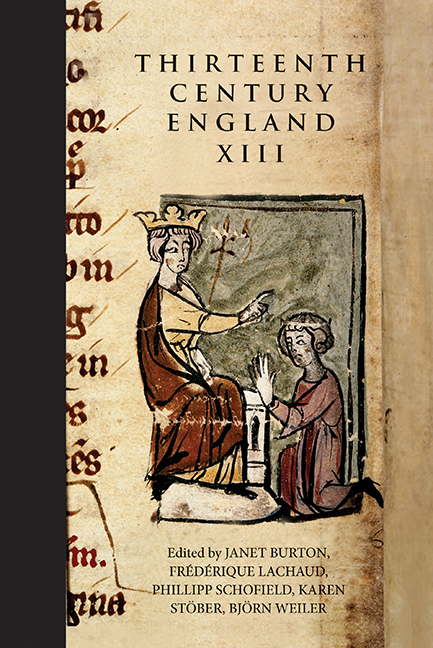Book contents
- Frontmatter
- Contents
- List of Illustrations
- Preface
- Contributors
- Abbreviations
- Political Ideas and Dialogue in England in the Twelfth and Thirteenth Centuries
- Peripatetic and Sedentary Kingship: The Itineraries of John and Henry III
- Peter of Aigueblanche's Support Network
- A Captive King: Henry III between the Battles of Lewes and Evesham, 1264–5
- The Conflictus inter Deum et Diabolum and the Emergence of the Literature of Law in Thirteenth-Century England
- Prosecuting Ravishment in Thirteenth-Century England
- John of Crakehall: The ‘Forgotten’ Baronial Treasurer, 1258–60
- Credit Finance in Thirteenth-Century England: The Ricciardi of Lucca and Edward I, 1272–94
- (Socio)linguistic Realities of Cross-Channel Communication in the Thirteenth Century
- The Treaties of Paris
- The Priory of Deerhurst and the Treaty of Paris (1259)
- The Treaty of Paris (1259) and the Aristocracy of England and Normandy
The Priory of Deerhurst and the Treaty of Paris (1259)
from The Treaties of Paris
Published online by Cambridge University Press: 15 September 2017
- Frontmatter
- Contents
- List of Illustrations
- Preface
- Contributors
- Abbreviations
- Political Ideas and Dialogue in England in the Twelfth and Thirteenth Centuries
- Peripatetic and Sedentary Kingship: The Itineraries of John and Henry III
- Peter of Aigueblanche's Support Network
- A Captive King: Henry III between the Battles of Lewes and Evesham, 1264–5
- The Conflictus inter Deum et Diabolum and the Emergence of the Literature of Law in Thirteenth-Century England
- Prosecuting Ravishment in Thirteenth-Century England
- John of Crakehall: The ‘Forgotten’ Baronial Treasurer, 1258–60
- Credit Finance in Thirteenth-Century England: The Ricciardi of Lucca and Edward I, 1272–94
- (Socio)linguistic Realities of Cross-Channel Communication in the Thirteenth Century
- The Treaties of Paris
- The Priory of Deerhurst and the Treaty of Paris (1259)
- The Treaty of Paris (1259) and the Aristocracy of England and Normandy
Summary
In my recent book on Westminster and Saint-Denis I draw attention to the importance of the resolution of what I called l'affaire Deerhurst in improving the atmosphere surrounding the final negotiations of the Treaty of Paris. Here I want to expand on my remarks in the book. The status of the priory of Deerhurst had brought the bishop of Worcester and the monastery of Saint-Denis into conflict. The priory was located on the River Severn in the county of Gloucester and geographically (though not juridically) in the diocese of Worcester. From its foundation it constituted an alien priory, that is to say, it was a dependency of a non-English abbey, in this case Saint-Denis. It was Edward the Confessor who endowed the Capetian royal monastery at Saint-Denis with its initial grant of property in Deerhurst.
Although not unique, Deerhurst was one of very few alien priories established before the Norman Conquest, the event which precipitated a flood of new endowments of such institutions in England, especially though not solely in favour of Norman abbeys. Some of the English properties with which Norman houses were endowed, while called priories, remained merely income-producing holdings or franchises, administered by overseers sent from the continental owners. On some of the properties, however, either immediately or after more or less lengthy periods, real monasteries, dependent on the continental mother houses, came into being, real in the sense of being corporate communities (fictitious persons) with official seals. They could make contracts with the permission of their mother houses, and they followed the latter's monastic rules. These conventual priories, as they have come to be called, regularly sent payments, tokens of dependency, to their mother houses. Their priors were elected by the resident monks, subject to confirmation by the mother houses, or else chosen from among the monks in the mother houses and imposed without the necessity of formal consultation with the local inmates (which, of course, does not mean that consultation was never practised).
It was not long after the Confessor endowed Saint-Denis with the Deerhurst properties that the French abbey dispatched monks to the site. The mother house retained the right of appointment of Deerhurst's priors, who were chosen from Saint-Denis’ community. The Confessor's endowment was not for a term of years but permanent, as is revealed in a charter of 1059 (‘donum in perpetuum sancto Dionysio’).
- Type
- Chapter
- Information
- Thirteenth Century England XIIIProceedings of the Paris Conference, 2009, pp. 133 - 140Publisher: Boydell & BrewerPrint publication year: 2011

